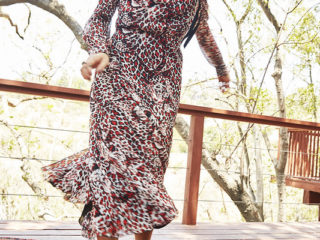Anxiety is a powerful protector. It is a bedfellow to everyone I know and shows up in many flavors. A small dose of anxiety helps me meet deadlines and remember to do important things for my family and work. When that small amount of anxiety is amplified, the floodgates open—taking me out and shutting down my ability to create, experience joy and trust myself or the world.
Anxiety is common but it can also be a best kept secret—as many people feel ashamed about their struggles or think they can navigate on their own. Often, the anxiety itself keeps many people from talking about and receiving much needed social and clinical support. Befriending your anxiety will help you shift the power it has in your life and begin to lead it, instead of allowing anxiety to lead you.
Befriending your anxiety will help you shift the power it has in your life and begin to lead it, instead of allowing anxiety to lead you.
Understanding the Spectrum of Anxiety
We all experience anxiety on a spectrum. It is important to understand it so you can best care for yourself and those in your life with anxiety.
Worry, concern, being extra alert or afraid are normal and healthy responses to threats to your physical and emotional well-being. Fear triggers anxiety to keep us safe. When life happens and your brain and body takes on emotional burdens, the protective aspects of anxiety stop being helpful and can drain you of your joy, peace and confidence. Further along this spectrum is where the more clinical aspect of anxiety lives. There are generally six types of clinical anxiety that are listed in The Diagnostic and Statistical Manual of Mental Disorders (DSM-5).
Generalized Anxiety
A type of anxiety that is constantly elevated. You find yourself worrying about anything and everything from at least six months or longer.
Social Anxiety
More than just your typical introverted angst, this type of anxiety is crippling and involves avoiding social situations for fear of being criticized, eating and/or speaking in public or feeling paralyzed in small talk social situations.
Phobias
More than just fears or being creeped out by something, a phobia can impact day-to-day functioning, sleep and overall well-being in attempts to avoid something or an experience. The list of phobias is exhaustive but the struggle is real for many.
Panic
Individuals who suffer from panic attacks experience chest pain, shortness of breath and often feel as if they are having a heart attack for at least a one-month period.
Obsessive Compulsive
The nuances of OC behavior have their own spectrum and flavor but can be debilitating impacting day-to-day functioning, work, and self-care in attempts to navigate unwanted or intrusive thoughts and rituals.
PTS (Post Traumatic Stress )
A traumatic event or the experience of several small ‘t’ traumas that are followed by poor sleep—often because of nightmares or intense dreams, panic or avoidance of anything that reminds you of the event or triggering images/beliefs/feelings.
Anxiety Fundamentals
Many people experience portions of the different types of anxiety. It is important to not minimize your experience on the anxiety spectrum. Waiting to share your struggles and ask for help will only make symptoms worse and the healing process longer.
Anxiety disorders are the most common mental illness in the U.S., affecting 40 million adults in the United States age 18 and older (or 18.1 percent of the population) every year. While anxiety disorders are highly treatable, only 36.9 percent of those suffering receive treatment.
Understanding anxiety is not a sign of weakness or something to be ashamed of is essential. Your anxiety is simply data on what needs attention in your life. It is something that is not to just analyze or think through—as this often spikes anxiety symptoms. Rebuilding trust with your body and your ability to tolerate discomfort is a big part of the healing process.
Responding to Anxiety
For mild bouts of anxiety, there are small and impactful actions you can take today:
- Unplug
At night and remove tech from your room. The temptation to scroll and binge watch a show can impact the length and quality of your sleep. - Move and sweat
Mild to moderate movement can help release anxiety held in your body and release soothing endorphins that bring calm and clarity. - Write
Researcher James Pennebaker found that journaling 15 minutes a day for five days in a row can decrease mild anxiety and related symptoms and co-occurring struggles. - Eat well
Making sure you are meeting your body’s needs is essential for all of us. Malnourished bodies often fuel anxiety. Make sure to work with a registered dietician, who promotes an intuitive eating approach rather than extreme dieting or food elimination (which can trigger eating disorders that are commonly associated with anxiety). - Talk
Sharing your struggles with anxiety with a trusted friend or mentor helps decrease the loneliness and shame that often accompany anxiety. - Compassion
Having compassion practices when your anxiety surfaces can be one of the most powerful antidotes to feeling overwhelmed or panicked.
When your anxiety is keeping you from functioning well in your life—work, basic self-care and connection— and taking a toll on your physical well-being, it is essential to not wait to get specialized clinical support. Treating the underlying issues of anxiety takes care, intention and experience. It is not a quick fix but is so worth the time and investment on this aspect of your health.
When looking for support, ask trusted friends, colleagues and local universities for referrals for psychotherapists, body work practitioners, acupuncture and massage therapists. Also, do your research and make sure to not settle until you find the right fit as you build your support team.
Anxiety is just a part of your story, but it does not define you.
What are some healthy ways to deal with anxiety?
Image via Melanie Acevedo, Darling Issue No. 11












3 comments
Thanks for such a wonderful article. I personally have faced panics and phobias and I recommend everyone to cater it as early as possible and live a peaceful life.
Thanks for reading and sharing your hard earned wisdom, Hilary. Take care of you. 🙂
Writing is my go-to when I’m feeling all kinds of negative emotions. Getting my thoughts down on paper always makes me pause and think! 🙂
–
Charmaine Ng | Architecture & Lifestyle Blog
https://charmainenyw.com